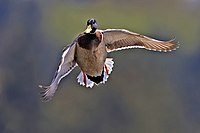Mass poultry vaccination planned by China
Wednesday, November 16, 2005
China's Chief Veterinary Office, Jia Youling, has announced that the country plans to take drastic steps to counter avian influenza by attempting to vaccinate its entire poultry stock of 14 billion birds. The move follows a number of reports of the virus spreading within the country and other Asian countries such as Vietnam engaging in culls to try and halt the disease's spread.
Millions of infected birds have been slaughtered in China and despite the spread of the virus it is only today that the World Health Organization has confirmed the first human cases in the country. The cases include at least one fatality, a 24-year-old female poultry worker in the eastern province of Anhui. The other confirmed case is a 9-year-old boy in the central province of Hunai who has since recovered.
It should be noted that these cases are the only documented cases reported. Obtaining truly accurate numbers is a challenge in China and elsewhere because bird flu outbreaks tend to occur in rural communities where there are not good hospital or laboratory services. Even if bird flu is suspected, blood samples have to be sent to one of only 200 specialized laboratories around the world. The cost of identifying and transporting to these labs from rural areas can be prohibitive even if the physicians in those areas are aware of such laboratories. There is little incentive for outbreaks to be reported by farmers, because any confirmation of a bird flu infection will results in the farmer's flock being destroyed and that may destroy the farmer's livelihood.
The officials in Liaoning have reportedly finished vaccinating all 320 million birds in the northeastern province. David Nabarro, the United Nations coordinator for bird and human flu, says such vaccination programs are "the right thing to do" since slaughtering the animals will not work due to the virus being so entrenched in China's birds.
According to Henk Bedekam, the World Health Organization's representative in China, the time of year is favourable to the continuation of the disease. He said that since the virus can survive in the cold, winter outbreaks are to be expected during cold months.
Avian influenza continues to be a very rare disease in humans, and so far only seems to be transmitted to people through direct contact with infected birds. Experts, however, are afraid that the virus will mutate into a strain that will be easily transmitted between humans.
Elsewhere in Asia, the lethal H5N1 strain of the avian flu has infected at least 126 people and killed at least 64 since 2003. WHO spokeswoman Maria Cheng said, however, that there is no increased risk of an influenza pandemic since there has been no observed genetic change in the virus or spread between humans.
Sources
[edit]- "China to vaccinate 14bn poultry" — BBC News Online, November 15, 2005
- Ho Binh Minh. "Vietnam culls poultry as Asia fights bird flu" — Reuters, November 15, 2005
- "First confirmed bird flu victim in China is 9-year-old boy" — Bangkok Post, November 16, 2005
- Joe McDonald. "China Confirms First Human Bird-Flu Cases" — ABC News, November 16, 2005
- "Can China cope with bird flu?" — BBC News Online, November 16, 2005


